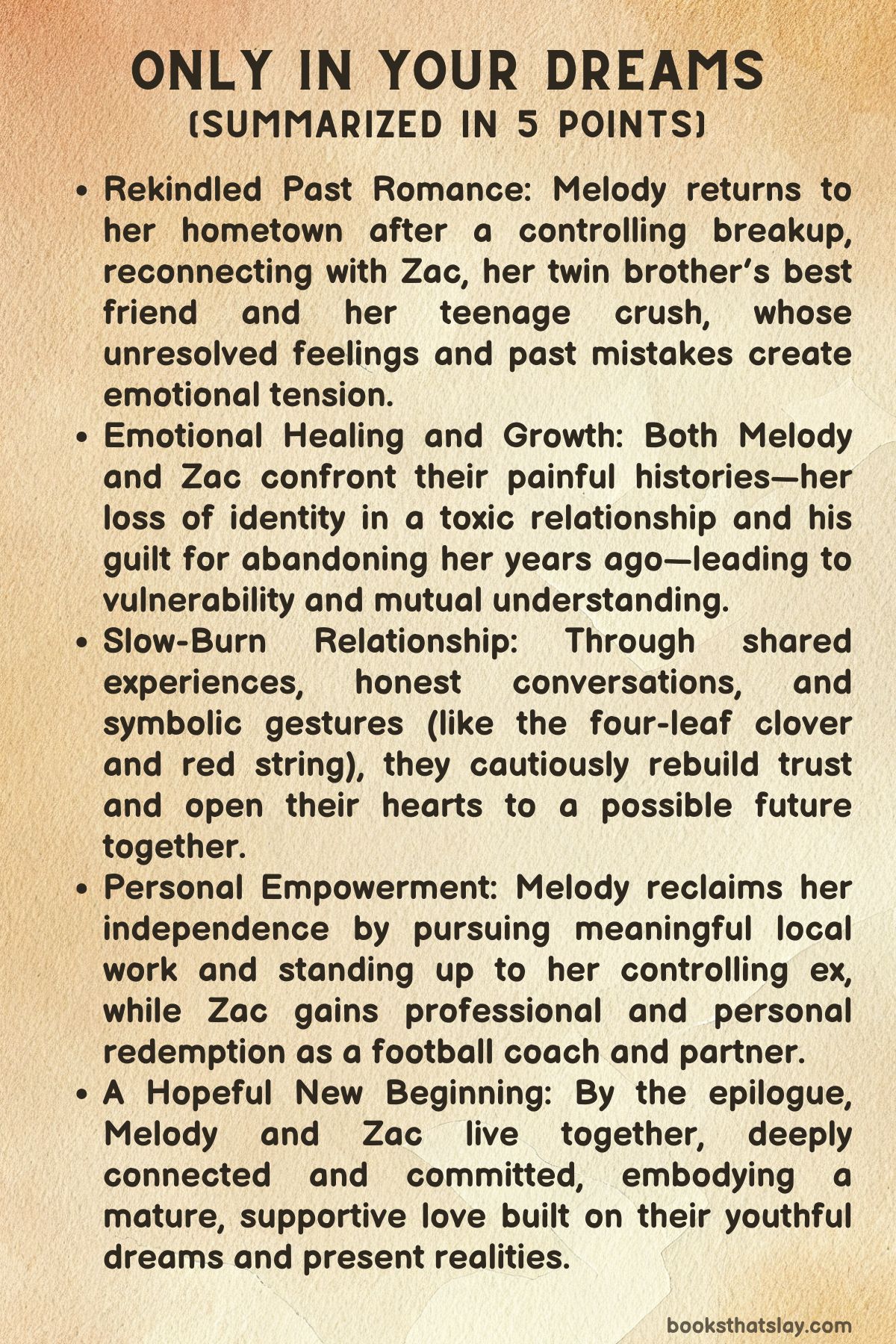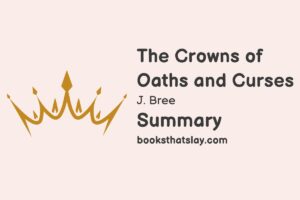Only in Your Dreams Summary, Characters and Themes
Only in Your Dreams by Ellie K Wilde is a tender and emotionally intelligent romance that explores what happens when a woman rebuilding her life finds herself face-to-face with the man who once broke her heart. At the story’s core is Melody Woods, a 28-year-old recovering from the end of a controlling relationship, who returns to her hometown of Oakwood Bay seeking refuge.
But her personal reawakening is complicated by Zac Porter, her teenage crush and her brother’s best friend, who still harbors guilt and love for the girl he once left behind. Together, their story becomes one of rediscovery, trust, and healing love.
Summary
Melody Woods is at a crossroads in her life. After being abruptly dumped by her long-time boyfriend Connor, she returns to Oakwood Bay, the coastal hometown she once left behind for the city.
Without a job or a place of her own, Melody takes up temporary residence in the apartment above the local bar where her twin brother Parker lives. Emotionally exhausted and confused, she begins unpacking the layers of her broken relationship.
Although Parker is ready to trash Connor for his cold exit and manipulative behavior, Melody finds herself less angry and more numb, a sign that the damage she suffered during the relationship was deeper than she realized.
Parker, eager to lift his sister’s spirits—and perhaps reclaim his own space—insists she attend the annual Labor Day camping trip with their group of friends in his place. Melody is reluctant, knowing full well that one of the attendees will be Zac Porter.
Zac isn’t just Parker’s best friend; he’s also the boy who broke her heart a decade ago. On the night before she left for college, he never showed up like he promised, and his silence since then has lingered like an open wound.
Still, Parker is adamant, and with the encouragement of her best friend Summer, Melody agrees to go.
Once at the campsite, the past rushes back in full force. Zac is still handsome and emotionally closed off, and Melody is struck by how much unresolved tension lies between them.
Though Zac barely speaks to her, it becomes obvious through subtle gestures that he still pays close attention. When someone hands Melody a cheeseburger, Zac quietly replaces it with a dairy-free version, recalling her long-standing lactose intolerance.
The small moment unsettles Melody, who is forced to confront how deeply she buried her feelings about Zac—and how she still resents the way he walked away without explanation.
Around the campfire, conversations about relationships and heartbreak trigger further introspection. Melody begins to realize just how emotionally manipulative Connor had been, shaping her diet, isolating her from friends, and masking control as care.
A spilled beer incident leads to a panic attack, revealing the scars of gaslighting and emotional abuse that Melody hasn’t fully faced.
Zac is the one to calm her down, grounding her with a calm presence and gentle care that contrasts with the cold detachment she’d grown used to.
When a storm hits the camp, the chaos leaves Zac and Melody stranded in the woods. Forced into close quarters, the emotional walls between them begin to crack.
Zac tends to her injured ankle, helps her dry off, and makes sure she’s warm and fed.
Their banter oscillates between defensiveness and flirtation, each moment thick with the weight of their shared past.
As they sleep in the same tent, the silence between them is no longer avoidance—it’s loaded with longing and uncertainty. A quiet act of tenderness, like Melody covering Zac with a sleeping bag, hints at a thawing in her heart, even if she isn’t ready to name it yet.
Back in town, Melody continues navigating her new life. A football game introduces her to the local WAGs (wives and girlfriends of players) culture, where she meets Emily Davies and slowly reintegrates into the Oakwood Bay social scene.
Watching Zac in his role as the head coach of the Huskies football team, Melody begins to admire the man he’s become. Despite being under pressure and criticized by townsfolk, he’s dedicated, thoughtful, and fiercely protective of his players.
When she learns that Zac secretly paid for her welcome-home shopping spree—claiming it was a gift from local shop owner Callie—her trauma from Connor resurfaces. She initially sees it as another manipulation, but a heartfelt conversation with Brooks, Zac’s friend and a former NFL player, helps her reframe the act as one of genuine kindness, not control.
The emotional intimacy between Zac and Melody continues to deepen. After a rough game, Melody visits Zac wearing his old high school jersey, offering him comfort in a time of defeat.
Their embrace is quiet, mutual, and full of meaning. Even when interrupted by Noah, a troubled player Zac has taken under his wing, Melody seamlessly supports them both, proving she belongs in Zac’s world.
Participating in the WAGs’ flag football game becomes a symbolic turning point for Melody. Diving for a dramatic save, she reclaims confidence and earns the respect of the town and Zac alike.
A rain-soaked kiss afterward solidifies their emotional connection, though Melody still plans to return to the city to reclaim her independence.
When Parker discovers their romance, an honest confrontation between him and Zac follows.
Years of resentment, guilt, and misunderstanding are laid bare, and forgiveness blooms through emotional transparency.
Their friends’ revelation that they had long suspected the relationship—and even placed bets on it—adds humor and warmth. Meanwhile, Zac refuses to ask Melody to stay, unwilling to pressure her into sacrificing her goals for his love.
But Melody, moved by his integrity and the life they’ve built together in Oakwood Bay, takes the leap herself.
She asks Zac to come with her, suggesting he apply for a coaching position with the Knights, the team in her new city.
Zac agrees without hesitation, ready to leave behind the Huskies and begin a new chapter by her side.
In the epilogue, Zac watches Melody thrive with her new team. Though his Huskies lose a game, he is full of pride for her achievements.
In a spontaneous moment, he proposes—raw, unrehearsed, and deeply felt. Melody says yes through tears, sealing a future built on mutual respect, love, and healing.
The red bracelet Melody once gave Zac becomes a quiet symbol of their unbroken bond. A bonus scene teases a new romance for Brooks, hinting at another transformation on the horizon and continuing the theme of second chances.
Only in Your Dreams ends with a sense of full-circle closure and hopeful new beginnings, rooted in the belief that love, when chosen freely and nurtured honestly, can be both redemptive and lasting.

Characters
Melody Woods
Melody Woods serves as the emotional core of Only in Your Dreams, a woman emerging from the shadows of emotional control and slowly reclaiming her identity. At 28, Melody is not just reeling from a breakup—she’s rediscovering her autonomy after years spent in a gilded cage built by her ex-boyfriend, Connor.
Her return to Oakwood Bay is more than geographical; it’s a return to her roots, both emotionally and spiritually. Melody’s internal struggle is defined by contradiction—she’s confused but not devastated by her breakup, indicating that her relationship with Connor was one of dependence rather than affection.
The camping trip becomes a rite of passage, where she’s forced to confront her past—particularly her unresolved feelings for Zac Porter—and reflect on the person she used to be versus who she wants to become. Her emotional journey is gradual, moving from guarded and defensive to vulnerable and open-hearted.
She has been deeply shaped by years of subtle emotional abuse, and her panic attacks and self-doubt are potent reminders of that trauma. And yet, there’s remarkable resilience in Melody; her participation in the WAGs football game, her moments of levity, and her eventual leap toward emotional intimacy all signal a woman determined not to let the past define her future.
Zac Porter
Zac Porter, the stoic yet emotionally complex coach of the Huskies football team, embodies the notion of silent penance. His arc in Only in Your Dreams revolves around guilt, redemption, and the enduring nature of first love.
Haunted by the night he stood Melody up a decade ago, Zac has never stopped loving her, a fact symbolized by the red bracelet he still wears. His emotional depth is revealed in small, quiet actions—swapping her burger for a dairy-free one, financing her shopping trip through Callie, helping her through a panic attack without needing recognition.
Zac is a man burdened by past mistakes, yet too emotionally reserved to ask for forgiveness outright. His quiet heroism stands in contrast to Melody’s ex, Connor, highlighting the difference between control and care.
Zac’s inability to articulate his feelings often puts him at odds with Melody’s need for transparency, but his steady, unwavering presence becomes the anchor she never knew she needed. His love is marked by patience and selflessness, as seen when he refuses to ask her to stay despite his own yearning.
By the end, Zac emerges not only as a romantic partner but as a symbol of healing love—imperfect, quiet, but deeply respectful and real.
Parker Woods
Parker, Melody’s twin brother, is the protective force in her life and serves as a bridge between her past and present. His character in Only in Your Dreams is defined by fierce loyalty and a tendency toward overprotection, especially when it comes to Melody’s well-being.
While his intentions are noble, Parker’s actions—such as scheming to make Melody and Zac share a tent—reveal his penchant for meddling. His dynamic with Zac is particularly compelling; once best friends, their friendship is strained by a decade of unresolved tension over Melody.
The eventual confrontation between the two men is cathartic and crucial, showing Parker’s growth as he learns to trust Melody’s judgment and Zac’s integrity. His acknowledgment of being blinded by his protectiveness marks an important shift in his character, allowing him to step back and support Melody without trying to control her decisions.
Connor
Connor exists mostly in the background of Only in Your Dreams, but his shadow looms large over Melody’s psyche. He is the embodiment of emotional manipulation wrapped in the guise of sophistication and care.
His “healthy living rules,” restrictive diet plans, and discouragement of Melody’s friendships were not acts of love but calculated control. Connor’s subtle form of abuse left no visible scars, making it harder for Melody to recognize the depth of her trauma.
Her panic attacks and conditioned self-blame are remnants of his emotional gaslighting. Though physically absent for most of the narrative, Connor’s role is pivotal as the emotional antagonist, the silent comparison against which Zac’s quiet love stands tall.
Summer
Summer, Melody’s best friend, is a warm, grounded presence throughout Only in Your Dreams. She serves as both comic relief and emotional anchor, helping Melody process her feelings while keeping her tethered to reality.
Her dating stories, insights, and unwavering support highlight the depth of their friendship. Summer’s lightheartedness masks her own emotional intelligence; she recognizes the damage Connor caused long before Melody does and encourages Melody to trust herself.
Her role is less about having her own arc and more about enriching Melody’s, providing perspective, humor, and a safe space for emotional unraveling.
Brooks Attwood
Brooks is a surprising source of wisdom and emotional insight in Only in Your Dreams, initially introduced as a flirtatious football player but later revealed to be far more layered. He becomes a sounding board for Melody, offering her candid, empathetic advice shaped by his own romantic failures.
His role evolves from peripheral friend to emotional confidant, helping Melody reframe Zac’s intentions in a way that eases her fears. His NFL past and own heartbreak add credibility to his advice, making his perspective feel earned.
The final tease of a romantic subplot in the bonus scene hints at future growth and a possible second-chance romance arc for Brooks, suggesting he, too, is on a path toward healing and rediscovery.
Emily Davies
Emily is the social glue of the Huskies WAGs and represents the world Melody initially views with skepticism. Bubbly, inclusive, and fiercely loyal, Emily’s easy friendship helps Melody re-engage with community life.
She plays a vital role in pulling Melody into social events, which serve as stages for Melody’s emotional growth and reintegration into her hometown. While she may not undergo significant personal change, Emily’s presence underscores the importance of supportive female friendships and the healing power of inclusion.
Callie
Callie, the boutique owner, functions as a quiet facilitator in the narrative of Only in Your Dreams, offering more than just clothing and accessories—she offers symbolic tools for transformation. Her decision to let Zac pay for Melody’s shopping spree under the guise of a welcome-home gift serves as a turning point.
The gesture, though triggering for Melody at first, becomes a clarifying moment when she realizes that not all generosity is transactional. Callie represents a maternal or elder-sister presence in the community, helping Melody feel seen and cared for without judgment.
Noah
Noah, a troubled player under Zac’s mentorship, serves as a mirror to Zac’s emotional complexity. His brief appearance adds another layer to Zac’s character, showing his capacity for leadership and compassion beyond the romantic sphere.
Melody’s ability to integrate seamlessly into this dynamic underscores her emotional maturity and readiness to build something stable with Zac. Noah’s presence isn’t central to the plot, but it enriches the world of Only in Your Dreams by showing the ripple effect of Zac’s integrity and care.
Themes
Emotional Recovery from Covert Abuse
Melody’s return to Oakwood Bay sets the stage for a slow confrontation with the emotional consequences of her past relationship, not just its obvious heartbreak. Her connection with Connor was characterized by a subtler, insidious form of control disguised as care.
The story highlights how damaging psychological manipulation can be, particularly when cloaked in routines that appear helpful or loving. Connor’s imposition of lifestyle rules—dictating Melody’s diet, social circle, and self-presentation—didn’t register as abusive in real time.
Only in the comparative safety of her hometown, and through interactions with emotionally sincere individuals like Zac and Summer, does Melody begin to recognize how thoroughly her autonomy was eroded. This delayed realization is depicted in moments of confusion, panic, and reflection, often triggered by innocuous events such as receiving the wrong meal or spilling a drink.
These episodes reveal how trauma lingers in the body and the mind, long after the source of harm has been removed. The novel doesn’t rush this process; it respects the time it takes for someone to not only identify emotional damage but begin to rebuild trust in themselves and others.
Zac’s quiet respect and attention stand in stark contrast to Connor’s performative affection, offering Melody a gentler reference point by which to reevaluate what love and care should feel like. Her recovery is nonlinear, marked by backslides and resistance, yet undeniably progressing.
This theme emphasizes that healing isn’t about a clean break, but about regaining clarity, self-worth, and the ability to discern true safety from deceptive control.
Reckoning with the Past and Seeking Closure
The unresolved history between Melody and Zac forms the emotional spine of the narrative. Their relationship, severed abruptly a decade ago, represents the kind of open wound that shapes adult behavior in subtle and pervasive ways.
The lack of closure from Zac’s disappearance left Melody with unacknowledged pain, which she had buried beneath the structure of her life with Connor. Zac, for his part, has carried guilt in quiet, enduring ways—symbolized most poignantly by the red bracelet Melody once tied on his wrist.
The story doesn’t present closure as a single moment of revelation or apology but as a series of emotionally charged encounters, conversations, and realizations that accumulate over time. Each shared tent, unexpected kindness, and candid conversation forces both characters to interrogate their assumptions and the pain they’ve internalized.
Their physical proximity during the camping trip and the storm doesn’t just trap them together logistically—it symbolizes how emotional avoidance eventually gives way to confrontation. The past becomes a living presence in their interactions, not merely a distant memory.
Melody’s initial mistrust is not about romantic hesitation alone, but about protecting a part of herself that Zac unknowingly damaged. As they reengage, they must decide whether they will let the past define them or use it as a foundation for something more truthful.
Closure, in this narrative, isn’t a tidy conclusion—it’s a recognition of pain, an acceptance of mistakes, and the courage to risk vulnerability again. The story treats that courage as both rare and vital.
Reclaiming Identity and Autonomy
One of the most profound arcs in only in your dreams is Melody’s gradual reclamation of her own identity. The woman who arrives in Oakwood Bay is emotionally untethered, uncertain of who she is outside the context of her failed relationship.
Connor’s influence shaped so many of her decisions—what she ate, who she spent time with, how she navigated conflict—that Melody’s sense of self is blurred. The novel patiently traces her rediscovery through mundane yet transformative actions: sleeping in a shared tent, playing flag football, laughing at dating horror stories, and asserting her needs without apology.
Each small moment serves as a step away from her previous performative compliance and toward authentic expression. Her anxieties are not trivialized; instead, they are treated as valid responses to years of conditioned submission.
When Zac tends to her during the storm or buys her a thoughtful gift through Callie, Melody initially flinches, unsure if this is another veiled attempt at control. But her ability to pause, reflect, and ultimately reframe those acts as sincere rather than manipulative demonstrates an evolving sense of discernment and agency.
The symbolic moment when she participates in the football game marks a turning point—it’s not just about athletic performance, but about reinhabiting her body, voice, and choices. By the time she proposes the idea of moving with Zac, it’s clear she’s no longer making decisions out of fear or dependency.
Her autonomy is hard-won, shaped by struggle, but it’s that very struggle that gives her choices true meaning.
The Complexity of Love and Trust
Rather than portraying love as a clean or immediate emotion, the novel grounds it in complexity, shaped by history, disappointment, and emotional baggage. Melody and Zac’s chemistry is undeniable, but their love story is complicated by past betrayal, present uncertainty, and deeply personal wounds.
Their romance isn’t about sweeping declarations or perfect timing—it’s about rebuilding trust in slow, often uncomfortable steps. Zac’s affection is steady and quiet, the opposite of Connor’s grandiose control, and that dissonance initially confuses Melody.
She questions Zac’s motivations, scrutinizing his kind gestures for hidden expectations. This skepticism is not irrational; it is the residue of years of being conditioned to doubt her own instincts.
Zac’s own hesitations stem from guilt and fear of rejection. What makes their connection believable is that both of them are allowed to be flawed.
Zac doesn’t magically heal Melody, and she doesn’t fix his regrets. Instead, they create a space where vulnerability is allowed, respected, and nurtured.
Their journey is marked by honest conversations, emotional missteps, and a shared willingness to keep trying. Even moments of intimacy—like their kiss in the rain or shared nights in the tent—are laden with the weight of history.
The story doesn’t romanticize love as rescue; it honors love as the decision to see someone fully, accept their scars, and stand beside them anyway. In this way, trust becomes the ultimate expression of love—not blind or immediate, but carefully built, deeply rooted, and resilient.
Community, Friendship, and Belonging
Beyond the central romance, the narrative emphasizes the sustaining power of friendship and community. Oakwood Bay is more than just a backdrop; it is a living, breathing character that offers Melody the grounding she didn’t realize she needed.
Her interactions with Summer, Parker, Emily, Callie, and even Brooks provide a constellation of support that counters the isolation she experienced in her relationship with Connor. These friendships are not presented as secondary to the love story but as integral to Melody’s healing and growth.
Summer’s fierce loyalty, Parker’s overprotectiveness, and Emily’s enthusiastic inclusion each play a role in reintroducing Melody to herself. These people see her not as someone who needs fixing, but as someone worth knowing just as she is.
The dynamic within the group is playful, emotionally honest, and at times chaotic, but it offers a space where Melody can safely test out new emotional boundaries. Zac’s integration into this social web further reinforces the sense of belonging—they are not just a couple isolated in romance, but part of a larger, interconnected system of care.
Even the humorous subplot involving the friends placing bets on their relationship underscores how attuned everyone is to their bond, long before the couple acknowledges it themselves. In a world that had become narrow and curated under Connor’s control, Oakwood Bay and its people remind Melody what it means to be accepted without performance.
Belonging here is not conditional; it is generous, consistent, and restorative.
Redefining the Future on One’s Own Terms
The conclusion of only in your dreams resists the fantasy of complete resolution and instead emphasizes choice, compromise, and mutual respect. Melody doesn’t abandon her ambition or sacrifice her career to preserve a romantic relationship.
Instead, the story explores how love can adapt to evolving priorities. Zac’s willingness to support her professional dreams—even when they lead her away from Oakwood Bay—reflects a mature, grounded form of partnership.
He never guilts her into staying; instead, he makes space for her decisions, trusting that their love will endure beyond proximity. This gesture is reciprocated when Melody invites him to join her, not because she needs him to complete her life, but because she wants to share it.
The narrative respects the importance of professional fulfillment and the intricacies of long-term planning. It avoids presenting romance as an endpoint and instead treats it as a foundation on which a shared future can be built.
Zac’s eventual job opportunity with the Knights offers a hopeful solution, but the emotional work preceding it is what gives the resolution its depth. The spontaneous proposal, her symbolic tattoo, and their shared dreams all reflect a commitment to crafting a life that is both rooted in love and responsive to individual growth.
In doing so, the story celebrates the idea that the future doesn’t have to mirror the past—that it can be rewritten with intention, courage, and a belief in something better.


